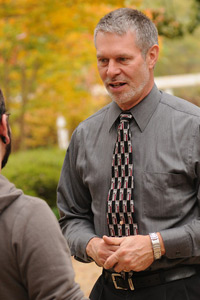Biography
Robert M. Hazen is Senior Staff Scientist at the Carnegie Institution’s Earth and Planets Laboratory and Clarence Robinson Professor of Earth Sciences, Emeritus, at George Mason University. He received the BS and SM in geology at the MIT, the PhD at Harvard University in Earth science, and was NATO Postdoctoral Fellow at Cambridge University.
Hazen is author of more than 450 articles and 25 books on science, history, and music. Symphony in C: Carbon and the Emergence of (Almost) Everything, published by Norton in 2019, explores many facets of element #6. His 2012 book The Story of Earth (Viking-Penguin) was finalist in the Royal Society and Phi Beta Kappa science book competitions. Hazen is a Fellow of numerous scientific societies. He received the 2022 IMA Medal, the 2016 Roebling Medal, the Mineralogical Society of America Award and MSA’s Distinguished Public Service Medal, the American Chemical Society Ipatieff Prize, the ASCAP-Deems Taylor Award, the Educational Press Association Award, and was the 2012 recipient of Virginia’s Outstanding Faculty Award. He has presented numerous named lectures and was Distinguished Lecturer for Sigma Xi and MSA, for which he is a past President. The biomineral “hazenite” was named in his honor.
Hazen’s recent research in part examines roles of minerals in life’s origins, with a focus on mineral-catalyzed organic synthesis and interactions between biomolecules and mineral surfaces. Since 2008 Hazen and his colleagues have explored “mineral evolution,” “mineral ecology,” and “mineral informatics”—new approaches that exploit large and growing mineral data resources to explore the co-evolution of the geo- and biospheres. These studies have led to ongoing development of “An Evolutionary System of Mineralogy.”
In 2008 Hazen was named Principal Investigator and in 2011 Executive Director of the Deep Carbon Observatory (DCO), a 10-year effort to achieve fundamental advances in understanding the chemical and biological roles of carbon in Earth (http://deepcarbon.net). With significant funding from the Alfred P. Sloan Foundation, the DCO is an international community of more than 1,200 collaborators from 55 countries with total anticipated funding from governmental, corporate, and private sources exceeding $500 million.
In October 2016 Hazen retired from a 40-year career as a professional trumpeter. He performed with numerous ensembles including the Metropolitan, Boston, and Washington Operas, the Royal, Bolshoi, and Kirov Ballets, the Boston Symphony, the National Symphony, and the Orchestre de Paris. Prior to his retirement he was a member and soloist with the Washington Chamber Symphony, the National Philharmonic, the Washington Bach Consort, and the National Gallery Orchestra.
Email: hazen@gl.ciw.edu

